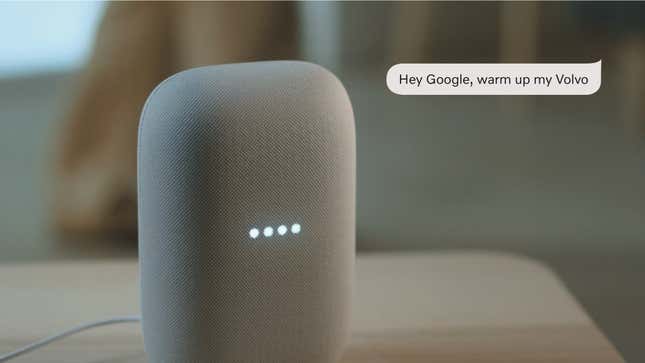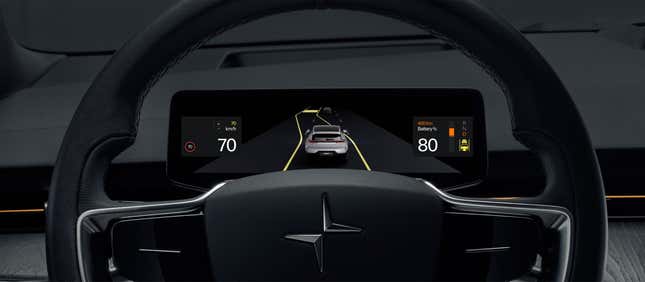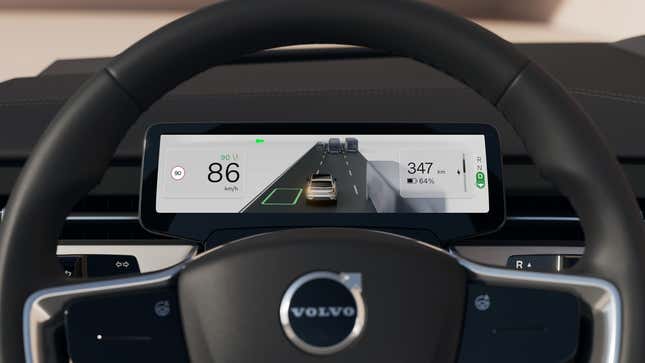Google is rolling out a slew of upgrades big and small to its infotainment at CES 2023, including upgrades to Android Auto and Google Services that are built into select models. Android Auto’s big facelift that conforms to different display sizes is finally becoming widely available, while native apps in the Volvo EX90 and the Polestar 3 will be the first to get Google’s new HD Maps and a few other updates before they roll out to other makes and models.
The new features coming to Android Auto — other than movable and resizable apps on the main screen — start with suggestions from the Google Assistant that’ll remind you of missed calls, let you easily jump back into music or podcasts, or share your ETA with friends and family. There’s also a new seekable progress bar that you can use to scrub through songs and podcast episodes, which is a big deal, according to Google. Podcasts aren’t really my jam, so I wouldn’t know.
WhatsApp calls are also being added to Android Auto soon, but only using the latest Pixel and Samsung smartphones. Samsung and Xiaomi users are getting the same digital car key feature that Pixel and iPhone owners already enjoy, although that’s due for release later this year. These digital car keys are currently supported by BMW, but Google says more brands are signing up.
Other than BMW with its Android Auto digital keys, Volvo and Polestar will be first in line for upgrades to Google Services that are built into the dashboard from the factory. These native services are different from Android Auto, which requires a smartphone and sits alongside Apple’s CarPlay as a supported interface in a car’s infotainment. Millions of cars come with Android Auto, but not as many have Google built-in services.
Having Google built-in means that a carmaker worked closely with Google to integrate services like the Google Assistant, Google Maps, and the Google Play store. These are mostly available on Android Auto, too; the difference is you don’t need a phone to play middleman. And since these native apps are deeply integrated into the car, they can control important functions. The Volvo EX90 and Polestar 3 will get the latest updates (over-the-air), which enable the Google Assistant to check on battery charge status or fuel levels, start or stop an EV charging session, and to change HVAC settings. Volvo says you can now ask Google to warm up the car via voice command. No need to take off those cozy winter gloves.

Apple is also eyeing similar features, but it’s interesting to see how automakers are handling big tech encroaching on their literal turf — behind the dashboard. Polestar, Volvo, and GM have taken to these native Google Services. Ford and Honda will do so soon, according to Google. Meanwhile, other carmakers like Toyota insists on developing their infotainment in-house, ceding no control to the big, bad Apple and Google.
But partnering with Google comes with some advantages beyond dibs on OTA updates. The Volvo EX90 and Polestar 3 will be getting Google’s latest HD maps, which the tech and car companies say will improve the cars’ assisted driving features. The finer detail and rich data from the hi-def maps are coming to the Volvo and Polestar models first, but will make it to other cars later.

These updates are a harmonious union of software and hardware, despite coming from two different industries. The lidar, cameras, and radar systems on the Volvo EX90 will be that much more efficient due to Google HD mapping, making its ADAS safer, according to Volvo:
By integrating Google’s HD map, we will be able to bring together data from our industry-leading sensor set in the Volvo EX90 with Google’s precise lane-level and localisation data to facilitate semi-autonomous driving features like lane change assistance and Volvo Cars’ Pilot Assist technology.
Volvo claims its partnership with Google will even help transition from assisted driving to autonomous driving in the future. I’m skeptical and certainly wary of such close ties to yet another tech company in the car, but it’s hard to not take Volvo’s word when it comes to safety.
